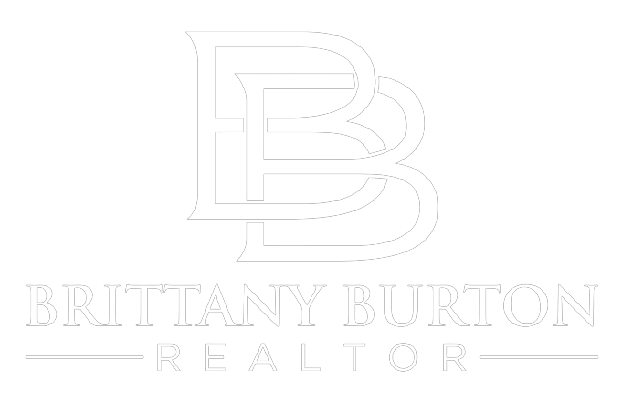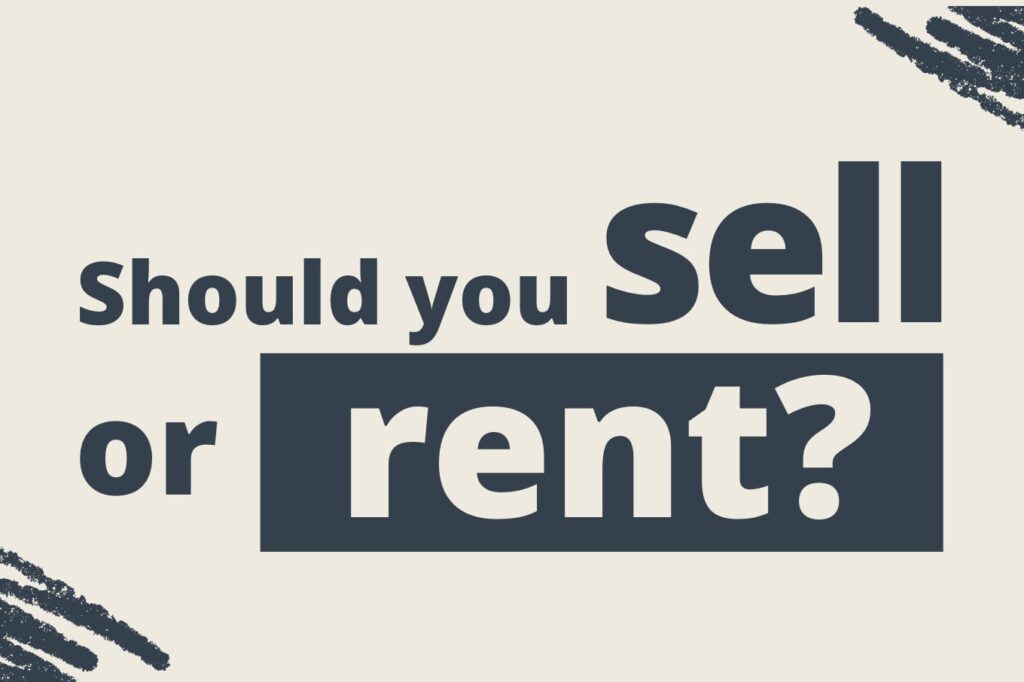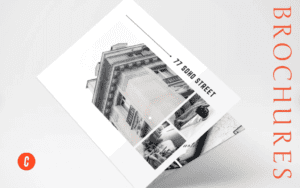Sometimes, you can only live on your property for so long until something happens and you have to move. Maybe it’s by choice, or work is forcing you to do it. Maybe you like the idea of earning some passive income. Either way, you will eventually be faced with the question: should I sell my home or rent it out?
Although it is sometimes difficult, owning two homes can actually work and be profitable if you rent out the previous home. By owning a home, you can start building serious wealth through cash flow and equity. It’s not the right move for everyone, so how do you know it’s right for you?
As with most real estate questions, these are not universal “right or wrong” questions. But once you understand the options, you can choose the best option for your situation. Not every house rents well, and not everyone is qualified to be a landlord. Here are some reasons to rent out your second home.
Rent: Positive Cash Flow
The first thing to consider when deciding whether to rent or sell your home is the math. Math probably wasn’t your favorite subject in school, but luckily you don’t need to know a lot about it to understand real estate investing math.
When your property is rented out, and you deduct all related expenses such as mortgage, taxes, insurance, utilities, management, vacancy, repairs, HOA, etc., will the property generate a monthly profit or loss? If you are getting benefit then keep it. When you consider the money that you earn by renting it out, you will get even more out of the property in the long run.
Rent: Return on Your Investment
Next, consider how much profit you’d make if you sold the property today, assuming you’ll lose about 10% in agent fees, closing costs, and other selling expenses. If you make little or nothing, it can be beneficial to hold on to assets and wait for the market to improve over time. This is especially true if the property will provide cash flow and appreciation, especially if you rent it out in the meantime.
Rent: Waiting for a Bad Market
Of course, we don’t have crystal balls, but trying to figure out where the market is going is not impossible. Take a look at your city’s growth—is it moving away from you or towards you? Are businesses moving to your area? Are homes being fixed or left to rot? You can’t know with 100% certainty, but by analyzing current trends in your market, you can make a more informed decision on what to do going forward.
All of this information will help you determine what the future will look like and how your neighborhood will increase or decrease in value. Plus, it makes sense that buyers or renters would want to be in an area where new, exciting things are happening. If you’re not sure or want a more experienced opinion, talking to a real estate agent may be a good option.
Rent: Option to return to the property
Listen, no one will judge you for loving your home. With such a big investment, we hope you at least like it. So if you’re hoping to return one day, renting may be the best of both worlds for you. This way, you still own the home, and you’re able to plan for the future with it while still renting it out for passive income.
Rent: someone paying your mortgage
It may sound weird, but it’s true. If someone else is paying you rent to live in their home and you’re not living with them, it makes sense to charge them enough to cover your mortgage. For many people, paying one less bill helps relieve stress while allowing them to keep the property.
We have discussed the reasons for renting out your second home. So it’s time to find out why selling might be the best option.
Free Real Estate Webinar
Shorten the learning curve by participating in BiggerPockets Webinars. Hosted by expert real estate investors, you’ll learn how to master the basics and get tips for finding your next deal. See what’s available and register for an upcoming session!
Selling: Better ROI Through Selling
If you want to make a profit from the sale, consider your return on investment (ROI). For example, if you can sell your home for a $100,000 profit and only receive $1,000 per year in cash flow, that’s a 1% ROI. It is better to take advantage of the $100,000 and invest it in something else that can generate higher returns.
Selling: Less Taxes to Pay
Keep in mind that the tax benefit for homeowners generally only counts toward a primary residence. Unfortunately, you can only have one of them at a time, and since we’re talking about a second asset here, those benefits won’t help you.
Also consider how much you pay for both homes. For many people, it would be difficult to maintain both of them. And depending on where you live, you could be paying a lot in property taxes alone. Think about the taxes that you will have to pay on not only your primary but also your secondary residence. Do the math reluctantly and choose the best option for you.
Consider the hypothetical case of Bob and Marge, who bought their home in 1990 for $150,000. Today, they can sell the property for $500,000, and take a $300,000 withdrawal after sales expenses. If they keep the home as a rental for, say, five years and then sell, they potentially owe $60,000 in taxes. But if they sell now, they can potentially keep that $300,000 in profit without paying any capital gains tax.
Selling: No need to deal with tenants
Honestly, not many people are ready for the life of a landlord. While some tenants are a dream to manage, others require significant time and patience to deal with. Granted, being a landlord is a skill you can learn, and just because you are one doesn’t mean you have to involve yourself directly with tenants. But if you choose to maintain that kind of distance, you’ll need to hire someone to bridge the gap, which is another expense. Property managers will be able to do this for you, but if you want to save money it’s best to avoid the extra expenses.
Also, consider the type of person you are. Are you infatuated with sad stories? Would You Postpone An Eviction Filing Because Your Tenant Called You In With One? You can say no and that you are able to stand your ground, but be honest with yourself when you answer it. Tenants will extend your limits to give them more time to pay their rent. Landlords have to protect those boundaries and work with the smooth efficiency of a business. When someone is late with their payments, there are two consequences: a late fee and filing to start the (lengthy) process of eviction. If you can’t do that, that’s perfectly fine. But you probably aren’t cut out to be a landlord.
On top of that, you have to realize that renting is not a guaranteed form of income. If you and the tenant have some issues or choose not to renew your lease, you could be out of that income for months.
Sell: Avoid Extra Expenses
In addition to your mortgage payment of principal, interest, taxes and insurance, you’ll incur a number of other expenses if you rent:
- vacant position
- property management fee
- capital expenditure and repairs
- maintenance
- Administrative, Bookkeeping & Misc.
- Other fees depending on the property and where you live
The 50% rule states that your expenses will be approximately 50% of the rent—not including any financing you’ll pay, such as principal and interest. If the rent is $1,000, and your mortgage payment (principal and interest) is $400/month, you can expect roughly $500 in additional expenses with cash flow of $100/month.
The golden rule of cash flow with rental is that it is based on a long-term average of your expenses, not what happens in a typical month. In a typical month, you will pay only your mortgage payment. Then all of a sudden, you’re hit with a $3,000 roof repair bill.
Get comfortable with the numbers in your neighborhood. For how much can you expect to rent the property? What is the average vacancy rate? If your property has carpets, how much will it cost to replace them between each tenancy? These are some of the most important questions that must be answered with certainty and honesty. Plus, before you decide to rent out your second home, you should have an answer you’re comfortable with.
Selling: Fleeing a Buyer’s Market
Sometimes the housing market goes up—other times, it doesn’t. If a lot of people are selling their homes in the same area as yours, this may be a sign that you should consider selling too. However, selling too many at one time can mean that the value of your property drops rapidly and leave you in a less financial position. If you see that possibility on the horizon, selling may be a good option for you.
Sell: Property makes poor rentals
Be honest with yourself and your possessions. Does it serve you best as a rental? Or invest elsewhere? The last thing you want is to keep your old home as a rental property, have it have poor cash flow, and then throw your hands up and say, “Rentals aren’t for me.” Such investments are both art and science, and just because a property has made a great home for you, it may not make a good rental.
run the number If you like what you see, go ahead. If not, sell the property and invest the proceeds elsewhere. And if you decide that being a landlord isn’t for you, you have other options for investing in rental real estate. You can buy it and hire a property manager. You can become a silent partner and handle all the management from your partner. Or you can go even further back and invest in private notes or real estate investment trusts.
Sell: Fund for Better Rental Investments
Just because your old home may not be a prime candidate for rental investment, doesn’t mean you shouldn’t be a landlord. Imagine you sell your house and walk away with $50,000. You use $25,000 as a down payment on the Fourplex, which has a cash flow of $500/month. Then, do the same thing with the other $25,000. If you can rent out all the space quickly, you can easily make thousands a month in rental income.
Of course, this may not be the case for you as a home you already own would actually be a great property to use as a rental. It is also possible that you are not confident in your ability to buy the rentals, which will allow cash to flow into your market. Regardless, these are all questions you need to ask yourself before making the decision to keep or sell your second home as a rental.
If selling is the right move for you, Get matched with an investor-friendly real estate agent quickly who specialize in your market,
Note by BiggerPockets: These are the views expressed by the author and do not necessarily represent the views of BigPockets.





